Text
That post about Marcille and Laios' relationship actually got me thinking about Chilchuck and Laios' relationship. Which is harder to see in some ways because it mostly consists of positive absences.
At first, viewers might be inclined to wonder why Chilchuck sticks with the party. He says it's because he took payment up front, but he could give back part of the deposit and leave. Two other party members left; Laios explicitly gave Marcille and Chilchuck a choice as to whether they would stay or go, and they both chose to stay.
We know why Marcille chose to stay; she wants to save Falin and she considers the other party members her friends. Why did Chilchuck stay?
Chilchuck actually respects Laios a lot -- food and monster weirdness aside -- and that mostly comes I think through the positive absences from above. The things that Laios does not do.
Laios doesn't deliberately expose Chilchuck to danger or regard him as expendable. When Chilchuck starts to get enthralled by the sirens' song, Laios immediately snaps him out of it. Contrast that to Chilchuck relating that other adventuring parties will sometimes bring half-foots along just to sacrifice them or use them as bait!
Laios doesn't insist that Chilchuck put himself in danger by getting into combat. Even in situations where they're in danger and could really use more combatants, he only ever asks Chilchuck to take on non-combat tasks such as creating distractions.
Laios doesn't get in the way when Chilchuck is working and follows his directives of what to do around traps. He respects Chilchuck's work so much that he will even hand over his sword without hesitation, even when doing such a thing causes it to be damaged!
Laios doesn't press Chilchuck to divulge private information. When Chilchuck says he doesn't mix his professional and private lives, Laios respects that and doesn't push.
All the other party members infringe on these boundaries in some way. Izutsumi tries to egg Chilchuck into combat; Marcille pries into his home life; Senshi deliberately provokes him when he's trying to work. Not Laios. Once Chilchuck sets a boundary, Laios does his best to always respect it. (And I think Laios appreciates having clearly defined Rules For Chilchuck.)
Laios is a good party leader and he takes care of his team. Maybe this is my age showing, but when you find yourself in a good work situation with a good boss, you stay in that job.
4K notes
·
View notes
Text
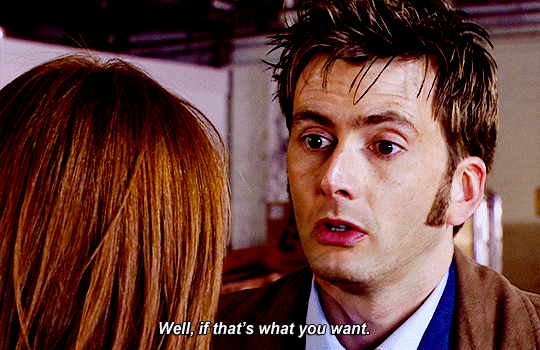
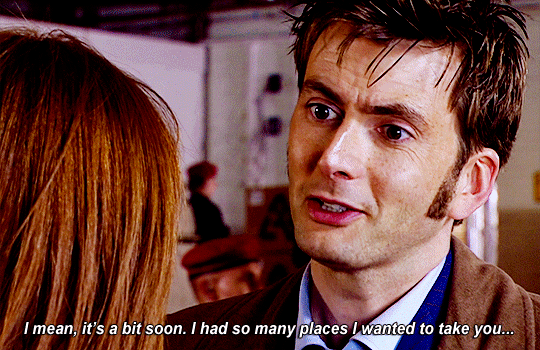
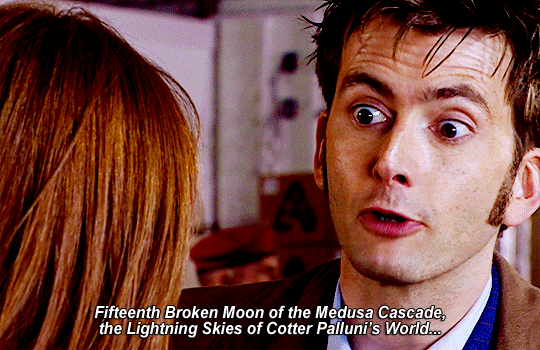


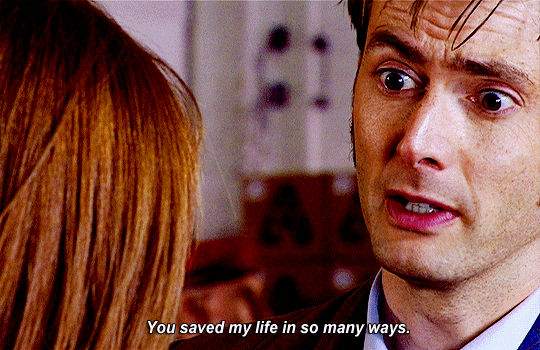
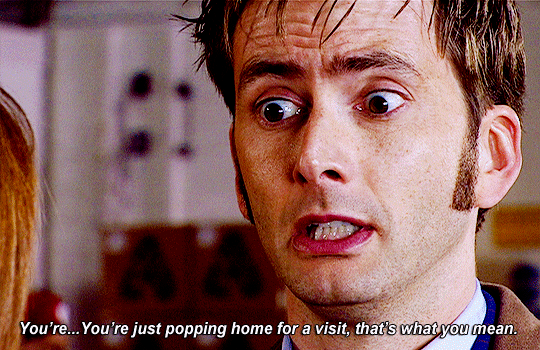
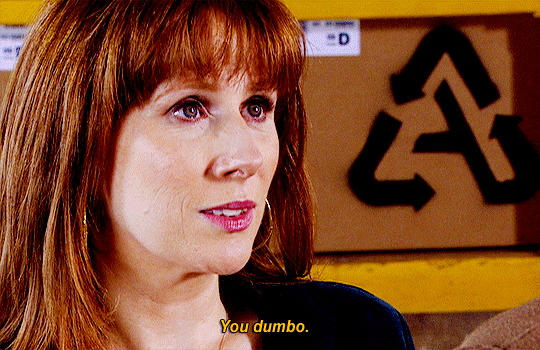
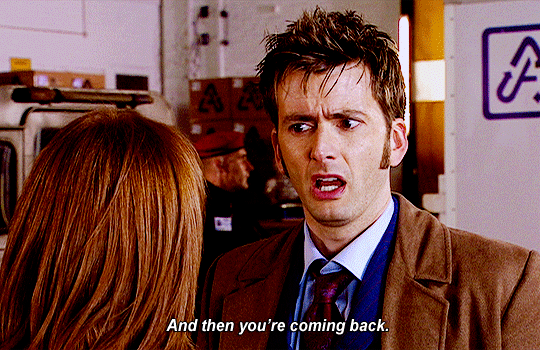


Donna: *about to leave for a few hours*
The Doctor on the verge of tears: *long dramatic speech about how Donna changed his life, saved him, made him a better man, rewrote his DNA, rewired his brain chemistry, imprinted on both of his hearts, and how her absence will break his hearts and leave him in darkness and nothing is the same without her*
+ BONUS
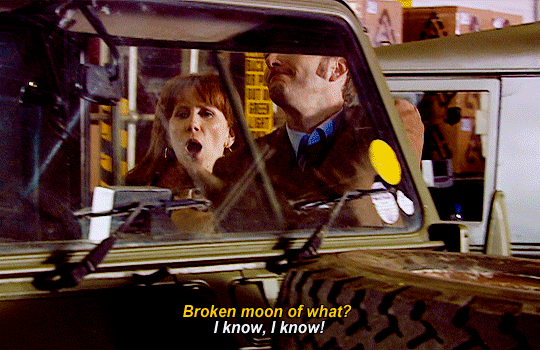

586 notes
·
View notes
Text
Horses: Since There Seems To Be A Knowledge Gap
I'm going to go ahead and preface this with: I comment pretty regularly on clips and photos featuring horses and horseback riding, often answering questions or providing explanations for how or why certain things are done. I was a stable hand and barrel racer growing up, and during my 11 year tenure on tumblr, Professional Horse Commentary is a very niche, yet very necessary, subject that needs filling. Here are some of the literary and creative gaps I've noticed in well meaning (and very good!) creators trying to portray horses and riding realistically that... well, most of you don't seem to even be aware of, because you wouldn't know unless you worked with horses directly!
Some Of The Most Common Horse + Riding Mistakes I See:
-Anybody can ride any horse if you hold on tight enough/have ridden once before.
Nope. No, no, no, no, aaaaaaaand, no. Horseback riding has, historically, been treated as a life skill taught from surprisingly young ages. It wasn't unusual in the pre-vehicular eras to start teaching children as young as 4 to begin to ride, because horses don't come with airbags, and every horse is different. For most adults, it can take months or years of regular lessons to learn to ride well in the saddle, and that's just riding; not working or practicing a sport.
Furthermore, horses often reject riders they don't know. Unless a horse has been trained like a teaching horse, which is taught to tolerate riders of all skill and experience levels, it will take extreme issue with having some random person try to climb on their back. Royalty, nobility, and the knighted classes are commonly associated with the "having a favorite special horse" trope, because it's true! Just like you can have a particularly special bond with a pet or service animal that verges on parental, the same can apply with horses. Happy horses love their owners/riders, and will straight-up do their best to murder anyone that tries to ride them without permission.
-Horses are stupid/have no personality.
There isn't a more dangerous assumption to make than assuming a horse is stupid. Every horse has a unique personality, with traits that can be consistent between breeds (again, like cat and dog breeds often have distinct behavior traits associated with them), but those traits manifest differently from animal to animal.
My mother had an Arabian horse, Zipper, that hated being kicked as a signal to gallop. One day, her mom and stepdad had a particularly unpleasant visitor; an older gentleman that insisted on riding Zipper, but refused to listen to my mother's warnings never to kick him. "Kicking" constitutes hitting the horse's side(s) with your heels, whether you have spurs on or not. Most horses only need a gentle squeeze to know what you want them to do.
Anyway, Zipper made eye-contact with my mom, asking for permission. He understood what she meant when she nodded at him. He proceeded to give this asshole of a rider road rash on the side of the paddock fence and sent him to the emergency room. He wouldn't have done it if he didn't have the permission from the rider he respected, and was intelligent enough to ask, "mind if I teach this guy a lesson?" with his eyes, and understand, "Go for it, buddy," from my mom in return.
-Riding bareback is possible to do if you hold onto the horse's mane really tight.
Riding a horse bareback (with no saddle, stirrups, or traditional harness around the horse's head) is unbelievably difficult to learn, particularly have testicles and value keeping them. Even professional riders and equestrians find ourselves relying on tack (the stuff you put on a horse to ride it) to stay stable on our horses, even if we've been riding that particular horse for years and have a very positive, trusting relationship.
Horses sweat like people do. The more they run, the more their hair saturates with sweat and makes staying seated on them slippery. Hell, an overworked horse can sweat so heavily that the saddle slips off its back. It's also essential to brush and bathe a horse before it's ridden in order to keep it healthier, so their hair is often quite slick from either being very clean or very damp. In order to ride like that, you have to develop the ability to synchronize your entire body's rhythm's with the rhythm of the horse's body beneath you, and quite literally move as one. Without stirrups, most people can't do it, and some people can never master bareback riding no matter how many years they spend trying to learn.
-You can be distracted and make casual conversation while a horse is standing untethered in the middle of a barn or field.
At every barn I've ever worked at, it's been standard practice with every single horse, regardless of age or temperament, to secure their heads while they're being tacked up or tacked down. The secures for doing this are simple ropes with clips that are designed to attach to the horse's halter (the headwear for a horse that isn't being ridden; they have no bit that goes in the horse's mouth, and no reins for a rider to hold) on metal O rings on either side of the horse's head. This is not distressing to the horse, because we give them plenty of slack to turn their heads and look around comfortably.
The problem with trying to tack up an unrestrained horse while chatting with fellow stable hands or riders is that horses know when you're distracted! And they often try to get away with stuff when they know you're not looking! In a barn, a horse often knows where the food is stored, and will often try to tiptoe off to sneak into the feed room.
Horses that get into the feed room are often at a high risk of dying. While extremely intelligent, they don't have the ability to throw up, and they don't have the ability to tell that their stomach is full and should stop eating. Allowing a horse into a feed/grain room WILL allow it to eat itself to death.
Other common woes stable hands and riders deal with when trying to handle a horse with an unrestrained head is getting bitten! Horses express affection between members of their own herd, and those they consider friends and family, through nibbling and surprisingly rough biting. It's not called "horseplay" for nothing, because during my years working with horses out in the pasture, it wasn't uncommon at all for me to find individuals with bloody bite marks on their withers (that high part on the middle of the back of their shoulders most people instinctively reach for when they try to get up), and on their backsides. I've been love-bitten by horses before, and while flattering, they hurt like hell on fleshy human skin.
So, for the safety of the horse, and everybody else, always make a show of somehow controlling the animal's head when hands-on and on the ground with them.
-Big Horse = War Horse
Startlingly, the opposite is usually the case! Draft and carriage horses, like Percherons and Friesians, were never meant to be used in warfare. Draft horses are usually bred to be extremely even-tempered, hard to spook, and trustworthy around small children and animals. Historically, they're the tractors of the farm if you could afford to upgrade from oxen, and were never built to be fast or agile in a battlefield situation.
More importantly, just because a horse is imposing and huge doesn't make it a good candidate for carrying heavy weights. A real thing that I had to be part of enforcing when I worked at a teaching ranch was a weight limit. Yeah, it felt shitty to tell people they couldn't ride because we didn't have any horses strong enough to carry them due to their weight, but it's a matter of the animal's safety. A big/tall/chonky horse is more likely to be built to pull heavy loads, but not carry them flat on their spines. Horses' muscular power is predominantly in their ability to run and pull things, and too heavy a rider can literally break a horse's spine and force us to euthanize it.
Some of the best war horses out there are from the "hot blood" family. Hot blooded horses are often from dry, hot, arid climates, are very small and slight (such as Arabian horses), and are notoriously fickle and flighty. They're also a lot more likely to paw/bite/kick when spooked, and have even sometimes been historically trained to fight alongside their rider if their rider is dismounted in combat; kicking and rearing to keep other soldiers at a distance.
-Any horse can be ridden if it likes you enough.
Just like it can take a lifetime to learn to ride easily, it can take a lifetime of training for a horse to comfortably take to being ridden or taking part in a job, like pulling a carriage. Much like service animals, horses are typically trained from extremely young ages to be reared into the job that's given to them, and an adult horse with no experience carrying a rider is going to be just as scared as a rider who's never actually ridden a horse.
Just as well, the process of tacking up a horse isn't always the most comfortable experience for the horse. To keep the saddle centered on the horse's back when moving at rough or fast paces, it's essential to tighten the belly strap (cinch) of the saddle as tightly as possible around the horse's belly. For the horse, it's like wearing a tight corset, chafes, and even leaves indents in their skin afterward that they love having rinsed with water and scratched. Some horses will learn to inflate their bellies while you're tightening the cinch so you can't get it as tight as it needs to be, and then exhale when they think you're done tightening it.
When you're working with a horse wearing a bridle, especially one with a bit, it can be a shocking sensory experience to a horse that's never used a bit before. While they lack a set of teeth naturally, so the bit doesn't actually hurt them, imagine having a metal rod shoved in your mouth horizontally! Unless you understand why it's important for the person you care about not dying, you'd be pretty pissed about having to keep it in there!
-Horseback riding isn't exercise.
If you're not using every muscle in your body to ride with, you're not doing it right.
Riding requires every ounce of muscle control you have in your entire body - although this doesn't mean it wasn't realistic for people with fat bodies to stay their weight while also being avid riders; it doesn't mean the muscles aren't there. To stay on the horse, you need to learn how it feels when it moves at different gaits (walk, trot, canter, gallop), how to instruct it to switch leads (dominant legs; essential for precise turning and ease of communication between you and the horse), and not falling off. While good riders look like they're barely moving at all, that's only because they're good riders. They know how to move so seamlessly with the horse, feeling their movements like their own, that they can compensate with their legs and waists to not bounce out of the saddle altogether or slide off to one side. I guarantee if you ride a horse longer than 30 minutes for the first time, your legs alone will barely work and feel like rubber.
-Horses aren't affectionate.
Horses are extraordinarily affectionate toward the right people. As prey animals, they're usually wary of people they don't know, or have only recently met. They also - again, like service animals - have a "work mode" and a "casual mode" depending upon what they're doing at the time. Horses will give kisses like puppies, wiggle their upper lips on your hair/arms to groom you, lean into neck-hugs, and even cuddle in their pasture or stall if it's time to nap and you join them by leaning against their sides. If they see you coming up from afar and are excited to see you, they'll whinny and squeal while galloping to meet you at the gate. They'll deliberately swat you with their tails to tease you, and will often follow you around the pasture if they're allowed to regardless of what you're up to.
-Riding crops are cruel.
Only cruel people use riding crops to hurt their horses. Spurs? I personally object to, because any horse that knows you well doesn't need something sharp jabbing them in the side for emphasis when you're trying to tell them where you want them to go. Crops? Are genuinely harmless tools used for signalling a horse.
I mean, think about it. Why would crops be inherently cruel instruments if you need to trust a horse not to be afraid of you and throw you off when you're riding it?
Crops are best used just to lightly tap on the left or right flank of the horse, and aren't universally used with all forms of riding. You'll mainly see crops used with English riding, and they're just tools for communicating with the horse without needing to speak.
-There's only one way to ride a horse.
Not. At. All. At most teaching ranches, you'll get two options: Western, or English, because they tend to be the most popular for shows and also the most common to find equipment for. English riding uses a thinner, smaller saddle, narrower stirrups, and much thinner bridles. I, personally, didn't like English style riding because I never felt very stable in such a thin saddle with such small stirrups, and didn't start learning until my mid teens. English style riding tends to focus more on your posture and deportment in the saddle, and your ability to show off your stability and apparent immovability on the horse. It was generally just a bit too stiff and formal for me.
Western style riding utilizes heavier bridles, bigger saddles (with the iconic horn on the front), and broader stirrups. Like its name may suggest, Western riding is more about figuring out how to be steady in the saddle while going fast and being mobile with your upper body. Western style riding is generally the style preferred for working-type shows, such as horseback archery, gunning, barrel racing, and even rodeo riding.
-Wealthy horse owners have no relationship with their horses.
This is loosely untrue, but I've seen cases where it is. Basically, horses need to feel like they're working for someone that matters to them in order to behave well with a rider and not get impatient or bored. While it's common for people to board horses at off-property ranches (boarding ranches) for cost and space purposes, it's been historically the truth that having help is usually necessary with horses at some point. What matters is who spends the most time with the animal treating it like a living being, rather than a mode of transport or a tool. There's no harm in stable hands handling the daily upkeep; hay bales and water buckets are heavy, and we're there to profit off the labor you don't want or have the time to do. You get up early to go to work; we get up early to look after your horses. Good owners/boarders visit often and spend as much of their spare time as they can with spending quality work and playtime with their horses. Otherwise, the horses look to the stable hands for emotional support and care.
So, maybe you're writing a knight that doesn't really care much for looking after his horse, but his squire is really dedicated to keeping up with it? There's a better chance of the horse having a more affectionate relationship with the squire thanks to the time the squire spends on looking after it, while the horse is more likely to tolerate the knight that owns it as being a source of discipline if it misbehaves. That doesn't mean the knight is its favorite person. When it comes to horses, their love must be earned, and you can only earn it by spending time with them hands-on.
-Horses can graze anywhere without concern.
This is a mistake that results in a lot of premature deaths! A big part of the cost of owning a horse - even before you buy one - is having the property that will be its pasture assessed for poisonous plants, and having those plants removed from being within the animal's reach. This is an essential part of farm upkeep every year, because horses really can't tell what's toxic and what isn't. One of the reasons it's essential to secure a horse when you aren't riding it is to ensure it only has a very limited range to graze on, and it's your responsibility as the owner/rider to know how to identify dangerous plants and keep your horses away from them.
There's probably more. AMA in my askbox if you have any questions, but that's all for now. Happy writing.
2K notes
·
View notes
Text
garashir is incredible because you have an exiled spy for an oppressive state with fucked parentage who doesn’t want to let himself be happy, but also can’t resist temptation; then you have a genius doctor who comes across as naive and too optimistic, but has had an ongoing identity crisis since the age of 15 because he learned his parents’ solution to his childhood disabilities was eugenics
and yet somehow they are so lame, just so embarrassing
301 notes
·
View notes
Text
The way Gideon and Dulcinea wanted to bounce in and out of the lives of their loved ones and only leave a positive impact without getting too vulnerable and Harrow and Palamedes just wanted them to stay for as long as they could. The way they sacrificed themselves because they didn't want to let them sacrifice anything else. The way they were both raised to think of themselves as bound to the service of mouldering houses that they hated, even both specifically born with the intention that they would die young. The way they both have to keep reminding themselves that the person they love is young and can't handle this shit. I'm either on to something or this is just the fevered ravings of a dying mind. They made a war of their lives.








374 notes
·
View notes
Text
I was originally mildly rooting for Edwin and Charles to be a thing but then the Confession Scene happened and you know what?
Yeah, friendship without romance CAN be enough of a motivation to give up heaven and brave hell and devote your (after)life to someone. I'm living for this platonic relationship being the driving force of love in the show. I really like how Charles handled that conversation, and how their love for each other got even STRONGER for the lack of reciprocated romantic feelings.
I'm extremely satisfied with how this turned out, actually.
298 notes
·
View notes
Video
youtube
Edwin & Cat King - You Fascinate Me
I ship it so hard. What’s their ship name? Catwin? I’m gonna go with Catwin.
104 notes
·
View notes
Text
Charles Rowland is dying. And Edwin Payne tells him all the cool things about being a ghost.
He does not mention Hell could be part of the after life until after Charles dies.
He has known nothing but suffering after death but keeps that to himself and tells this poor boy ghosts can walk through doors and still interact with the material world, all the while not sharing Charles is in fact dying. DO YOU SEEEE?
What I’m saying is EDWIN PAYNE IS MY PRECIOUS BABY ANGEL
308 notes
·
View notes
Text
I can’t believe Charles within a couple of hours of meeting Edwin really went if I have to choose between heaven and you then I pick you
1K notes
·
View notes
Text
Dead Boy Detectives has everything:
Co Dependent queer platonic tough to define Best Freinds who would and have gone to hell for each other. they have an office with a cupboard full of board games, and a long history of Noodle Incident cases of '04, and also a bunch of maneuvers with code names. They are also ghosts who solve mysteries for other ghosts.
One is a sassy well read diva in a stupid little bowtie. he keeps meticulous notes, and went to hell on a technicality. he has no rizz and has a sexual awakening at the hands (paws?) of a supernatural Cat King
the other is a cheerful happy bruiser, the brawn with a pocket demension only he can navigate in his backpack, a magic cricket bat, and wells of anger deep down
they team up with a cool psychic (whos also a pretty tree) dealing with her asshole abusive boyfriend who was literally a demon while also trying to restore her memories (she also has a hilarious hate off off with the nerdy one)
then they add a sweet shut in who isn't very brave but is very inquisitive and has excellent reading comprehension and is actually the most brave
and their landlady is a hot goth Sapphic butcher who is done with their shit (but not really)
and the main antagonist is a cunt serving witch with an iron cane chewing up the scenery, just camp queen obsessed with Beauty and Revenge as she should be
she turns her crow familiar into an astrology loving twink to honeypot the nerdy one but the crow catches feelings whoops
the cat king who deserves his own mention again. he's here to seduce a stuffy British detective/tease, cause problems on purpose, reluctantly help solve those problems and mostly slut it up.
a bureaucrat learns to VERY reluctantly embrace the beautiful power of friendship after being swallowed by a fish
its set in a gorgeous seaside town with a light house! and a malt shop!
because this is all A Scooby Doo homage!
It's an episodic Case Of The Episode format! with strong serialized elements!
and as if that wasn't enough there's even Death of The Endless.
what more could any person possibly want in a show.
oh and there's a lot of really interesting themes around internalized homophpbia, abusive relationships and trauma and toxic anger and learning to love and trust and help other people again in spite of and because of the bad parts.
893 notes
·
View notes
Text

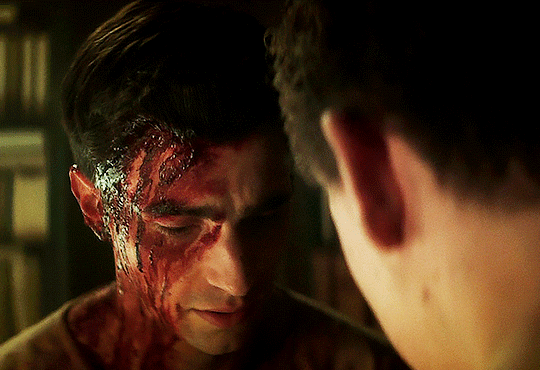

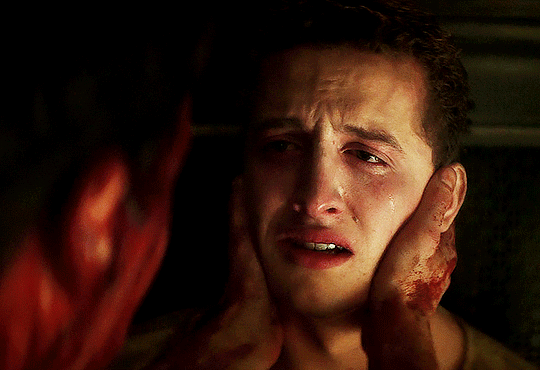

I'm truly sorry for all of this.
For what I did. I didn't know.
1K notes
·
View notes
Text

Charles “We’ve got literally forever to figure out the rest means” Rowland
1K notes
·
View notes
Text

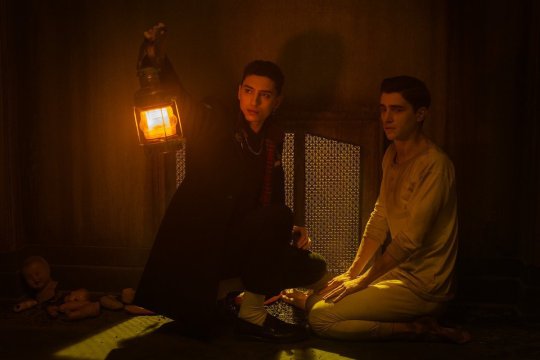
Edwin and Charles are each other's light in the dark
758 notes
·
View notes
Text
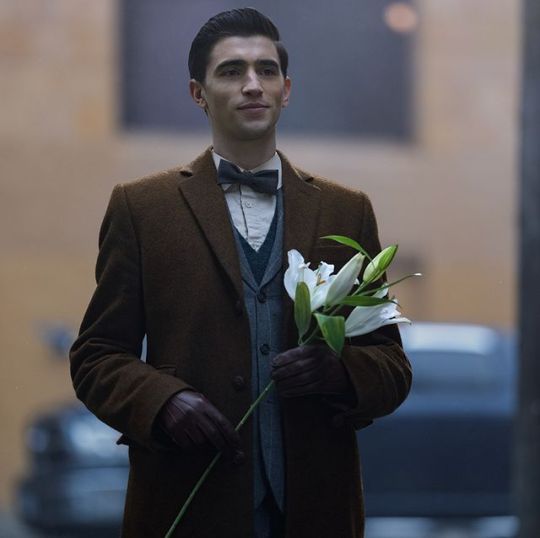
I want all of you people to know that the Cat King gave Edwin a Lily Flower, which is deadly for cats but it symbolises rebirth, condolences, commitment and purity of adoration and love.
Cat King gave his crush a flower that's deadly to him to pay his respects and express his commitment.
Oh, I will not shut up about them.
2K notes
·
View notes
Text
When we're looking at why Wei Wuxian took so long to even consider that Lan Wangji might really like him, I think we should maybe place more weight on that time when they were trapped in a cave together at around age eighteen, and Lan Wangji told him his dad was dying and started to cry and Wei Wuxian was like SHIT and fidgeted awkwardly for a while like ahhhhh I hate when people cry especially men what do I do????
And then he tried to find something to say and Lan Wangji was like 'shut up' and he shut up, and Lan Wangji said 'you're a loathsome person' and he shut up so hard he left him alone for three entire days.
Like if I spent three days trapped in hell with someone, restraining myself from reaching out for human interaction because not subjecting them to my personality was literally the only thing I could do to help with their state of misery.
I would have a real hard time letting go of the understanding that the thing this person wanted from me was not to have to deal with me.
482 notes
·
View notes
Text
‘Teaching Jake about the Camcorder’ Interpretation
In order to understand what’s going on in this short film, I think it’s important to first identify its themes. This theme starts revealing itself early on within the video. In fact, right from the beginning of the second run through we see of the tape.
Before I continue on with my analysis, it’s important to note the way that the story is being communicated. The film is shot as though we are Jake, watching through an old home video of our father. It’s essential to understand that this tape is representing two opposing ideas; subjective memory and objective history. It’s fascinating to see these two contrary ideas symbolized by a singular medium, and it’s fascinating to note how it was done; the repetition representing objectivity, while the changes in the film representing subjectivity.
From the very beginning of the second runthrough, we see an immediate diversion from the original we just watched. This difference is the father’s facial hair. Within the first playthrough of the tape, the father’s facial hair was limited to a moustache, while in the second runthrough, we notice that this moustache has been exchanged for a beard. It’s a small change, but it’s a change that sets up the theme of the story. By swapping out the father’s moustache for a beard, the film is immediately communicating to us that memory isn’t reliable.
Within this film, there are two character arcs. There is the character arc of the father, and there is the character arc of Jake. Both tackle the same theme.
This theme is the fear of time affecting an individual’s memory. Specifically, the theme is the fear of forgetting and/or being forgotten.
Again, memory is unreliable. It shifts and changes and fades, especially when the memory takes place early in a person’s childhood, and, as evidenced by the father’s surprise upon seeing Jake through the screen, we can assume that the father died early in Jake’s life.
This fear is represented by the character of the shadowed figure; a literal faded, black hole in Jake’s tape/memory.
The character arc of the father is much more active than the character arc of his son’s.
See, the father’s character arc is all about the resignation of being forgotten, while the son’s character arc is coming to terms with forgetting his father.
Again, this theme first shows itself within the second runthrough of the tape. While the father is explaining the rewind button, for the second time, to a young Jake, in the background of the frame we see a figure. This isn’t yet the fully shadowed figure, but instead, it seems to be a sort of inbetween stage. It’s faded and hard to make out, but there is still shadow and highlights, and it still seems to be affected by the environment around it.
This is meant to represent how Jake’s memory of his father is beginning to fade.
When the shadow figure fully realizes itself, and it has its first encounter with the father, the father is terrified. The father is scared of being forgotten, and with good reason. The idea of your child letting you slip from their memory is terrifying. But the father also quickly realizes that Jake continuing on to grip on so tightly to this moment is unhealthy, restricting Jake to reliving the past instead of living his life to its full potential.
Then comes probably what I consider the strangest scene in the film.
When the father stares at the stuffed rabbit, it’s a look of terror. I thought about why this could be, and while the explanation I came up with isn’t based on the most solid ground, I feel the way it fits with the rest of the story is sufficient. In some eastern asian folklore, the rabbit represents longevity due to its connection to the moon, sometimes portrayed as grinding elixirs of life. The fact that it’s a stuffed rabbit could also be relevant, connecting to the idea of the tape recording being a false representation of eternal life.
The fact that the father looks terrified of this stuffed rabbit could indicate, again, his realization that Jake rewatching these tapes over and over and trying to keep this false memory of his father alive isn’t healthy.
I admit, this interpretation is a bit of a stretch, but, again, I believe it fits in with the themes of the film, so it’s definitely a plausible interpretation.
By the end of the film, the father has completely resolved himself to the idea of being forgotten. He gives Jake one final reassurance of his pride, then leaves him. He walks through the door, colored with an orange light. To the left of our old television, we see this same orange light, and in it, the shadow figure.
The implication here is that the father turned into the shadow figure, or, in this case, allowed himself to be forgotten. The father stopped fighting against the flow of memory and time and allowed himself to fade from his son’s memory. And though Jake’s memory is faded and vague of his father, the influence that his father had on him is still very real and sticks with him. This is why the shadow figure reappeared in our immediate vicinity.
In fact, the figure didn’t even seem especially malicious when we saw it flash in the orange. Not to me, at least. Part of this has to do with the lighting shown throughout the film. As it progresses, the film began to get further and further desaturated, the two most colorful versions of the tape being the very first runthrough and the very last runthrough. Everything in between became overlaid with this unsettling, cold blue hue. But at the end, when the father walks through the door, the lighting around him is this warm, inviting orange.
After giving up on fighting so hard to remember the specifics of his father, when both parties give in to the fact that neither can healthily hold on, the memory instead becomes a vague, warm feeling about the idea of his father.
This film is a wonderful introspective about grief and memory, and how aging and time affects them.
464 notes
·
View notes